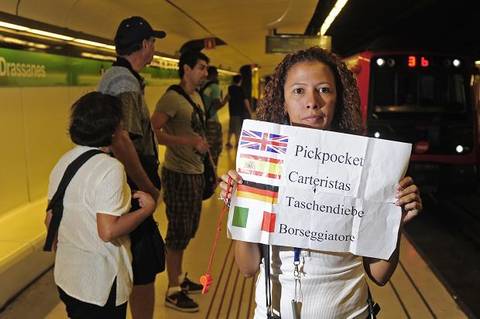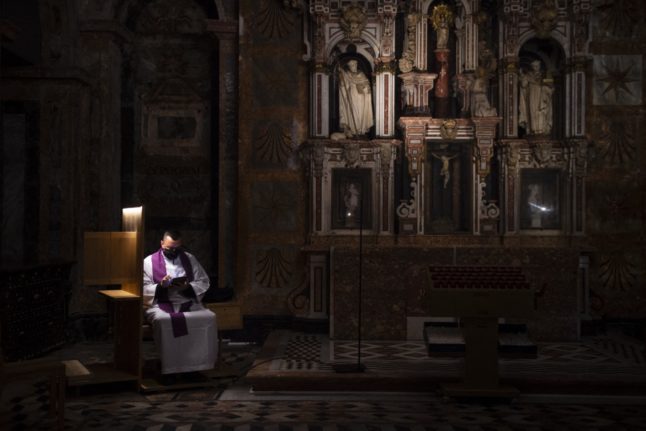How bad is it?
According to the latest headlines, Barcelona is in the grip of a crime wave. The latest police statistics show that crime in the first half of 2019 soared by 9 percent within the Catalan capital and that’s on top of the 17.2 percent rise in reported criminal infractions in Barcelona during 2018,
That’s a total of 115,014 reported crimes between January and June and doesn’t include the July figures which so far add up to five murders – three of which involved fatal shootings and one knifing- several attempted rapes, fights breaking out between rival gangs and dozens of dozens of reported theft, most of them on the metro.
Los Mossos, the regional police force in Catalonia estimate that some 100 pickpockets are operating every day on Barcelona’s metro network, targeting tourists at the busiest stations and on the most crowded trains and most commonly swiping wallets and mobile phones.
In June alone, the Catalan transport police stopped suspected 470 pickpockets and carried out 67 arrests, including one thief who had been arrested 27 times previously.
READ ALSO: Afghan ambassador to Spain becomes latest victim in Barcelona crime wave

They also operate around the busiest tourist attractions and on the boulevards and terraces of the old city, often working in small groups using highly effective distraction techniques.
The rising crime has been blamed on too many tourists, 8.9 million visited Barcelona in 2018 saturating the port area and Ciutat Vella, and providing easy pickings for pickpocketing gangs.
Locals also complain that of a lack of policing, in part due to resources being stretched with civil unrest connected to the independence movement, and a lack of prioritising the fight against crime during the administration of Ada Colau, who became mayor of Barcelona in 2015, since when crime has been on the rise.
In fact, so noticeable is the rise in crime that city authorities have just appointed a sort of crime csar, Albert Batlle, deputy mayor has also been given the role of councillor in charge of security.
This is in addition to the pledge that 320 more Mossos officers will be put on patrol on Barcelona’s streets plus a drive to recruit 1,000 more ‘Guardia Urban’, city police officers, over the next four years.
But don’t be too alarmed
Although petty theft and pickpocketing are the main problem, violent crime is still relatively unusual and Barcelona remains one of the safest cities in Europe.
Last year the city witnessed an average of 299 daily robberies, or 12 every hour, the majority of which took place in Ciutat Vella, Barcelona’s historic neighborhood,but very few of them involved violence.
Although petty crime is high, numbers for more serious crimes such as murder and homicide are very low: 10 in Barcelona and 45 across all of Catalonia for the whole of 2018.
The ‘Safe Cities Index 2017’ by The Economist Intelligence Unit (EIU), confirmed that Barcelona was one of the safest cities in the world in terms of general crime and overall ranked 13th in the world.
Just two years ago, Barcelona ranked as 4th safest in European Union and 5th safest in all Europe, so in 2017 Barcelona was only lower in general safety terms than Stockholm, Amsterdam, Zurich and Madrid.

Why don’t the police lock away the criminals?
People often complain that they report the crime to police, often providing photos of the perpetrators snapped hurriedly on their mobile phones, believing it should be easy enough to round up the thieves.
But even if the police did have the manpower and the will to do it, there is little they can do by law to keep them off the streets.
Under Spanish law, stealing something with a value less than €400 is considered a falta (misdemeanour), and not a delito (crime). Those caught will be liable for a fine, of probably no more than €50, but however many times you re-offend, it remains a misdemeanour and as an offence it is not cumulative.
That’s why gangs of pickpockets appear so brazen, often working the same beat with no need to even hide themselves. Some people have complained that after going to the police station to file a report and returning to their hotel, they see the same people who just robbed them, in the same spot waiting for new victims.
So, what about these citizen patrols?
Various groups have got together to organize patrols of the worst crime streets and metro system and are using various channels to share images of the perpetrators and how they operate.
Roar BCN, are a group of Barcelona who run a Facebook page which is regularly updated with photos and videos of crimes being carried out on the underground. It’s aim is to identify the repeat offenders and drive them out.
Posts like the following are added every day:

Started in 2014, the group which styles itself on the Guardian Angels of the New York subway was started in 2014 but has stepped up activity in April when crime became a major concern.
“We are looking for volunteers to be part of our SAFE BRIGADES to prevent, inform and help people avoid crimes and robbery,” a spokesman for the group said.
“The group needs people that want to take real action, help others and be part of the city's change”.
There’s also Patrulla Ciudadana, whose members ride the subway on the look out for crime, armed with a whistle to attract attention when they see a pickpocket in action they have been teaming up to drive recognised repeat offenders – or those caught redhanded – off the metro trains.
La Patrulla Ciudadana limpiando la estación de Diagonal.@AMEINVE @MNAnoticies @davichu1978 pic.twitter.com/XxSv2MfSop
— Patrullaciudadanabcn (@Patrullaciudad1) July 28, 2019
The most famous of them is Eliana Guerrero, a 47-year-old woman from Colombia who began patrolling the Barcelona metro more than a decade ago, and who can still be found blowing a whistle at suspected “carteristas” (pickpockets) as she holds up a placard identifying them as such in four languages.
Earlier this summer, a group of residents formed Salvalona, a lobby group formed to raise concerns over crime in the city, which also plan to stage patrols.
They have a website with updates on crime issues affecting Barcelona residents.
There's also HelpersBCN, a group which runs a twitter account which posts reports on thefts and perpetrators as soon as they are reported.
? Detectats cinc lladres menors d’edat de caçera a ?Passeig de Gràcia @mossos
❗️Són cinc nois amb accent àrab, un vesteix texans ajustats, sabatilles negres, samarreta negra i gorra de beisbol negra.#AlertaHelpers pic.twitter.com/utsPIJYKl3
— Helpers [BCN] (@BCNHelpers) July 27, 2019
The groups invite you to get in touch if you have been a victim and provide as many details as possible so others can be alert.
What to do if you are robbed:
If you want to make a claim on insurance or because you have had documents stolen that need replacing (passports, NIE, driving licence, etc) you will need to file a ‘denuncia’.
Authorities have simplified the process, probably because of the sheer volume of pickpocketing claims and it is now no longer necessary to spend hours at a police station filing a report. Instead, you can report it online. HERE
How to avoid being robbed:
Basically, try not to look like a tourist and your chances of being targeted will be greatly reduced. Be sensible and don't take all your valuables out and about with you, that means don't carry all your credit cards, cash and ID in one wallet. Don't leave them on display in back pockets, or over the shoulder bags with easy access.
Avoid crowds and be alert for tricks that include someone distracting you by asking for directions, spilling coffee on you or asking for help. Don't ever leave your bag slung casually over the back of a chair or even under a table.
READ MORE: Ten top tips to avoid being pickpocketed in Spain



 Please whitelist us to continue reading.
Please whitelist us to continue reading.
Member comments